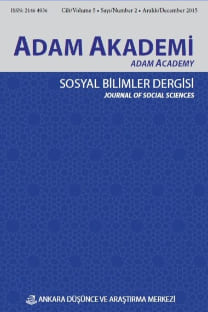DARBEYE KAFA TUTMANIN İNSANİ İMKÂNI: SOSYAL BÜNYEYİ İNŞA ETMEK VE ONA DOST OLMAK
Dostluk, kişinin diğerini iradi, bilinçli ve çıkarsız sevmesi ve onun tarafından sevilmesini taşıyan bir anlamdır. Dostluk yoluyla yaşama daha sıkıca tutunabilen insan diğer kişilerle ortak sevinç ve üzüntülerde buluşabilir. İradi, bilinçli, çıkarsız ve meşakkatli bir sevme-sevilme ilişkisine vurgu yapan dostluk, sadece bireyler arasındaki ilişkiyi anlamlandırmaz. Kişinin sevgiyle yöneldiği her şeyle dostluk ilişkisine girebileceği de söylenmiştir. İnsanların, ortak ufukta, hikmet ve adalet ekseninde bir araya gelerek inşa ettikleri organik bütüne sosyal bünye denebilir. Böylesi bir bünyeyle de dostluk ilişkisi -belki de en ideal anlamda- kurulabilir. İnsanın fazilet merkezinde, ortak iyiyi artırmak gayesiyle oluşturduğu sosyal bünyeyle kurduğu dostluk, ona zarar verici içeriden ve dışarıdan tüm müdahaleleri olumsuzlama yetkinliğine sahip olabilir. Meşru halk iradesinin gaspı olarak anlaşılan darbelere kafa tutmanın bu anlamda en insani ve geçerli yolu, böylesi bir sosyal bünyeyi inşa etmek ve ona dost olabilmekten geçmektedir.
Anahtar Kelimeler:
Sosyal bünye, dostluk, hikmet, adalet, darbe
HUMANISTIC POSSIBILITY OF OPPOSING TO COUP: CONSTRUCTING SOCIAL BODY AND MAKING FRIEND WITH IT
Friendship is a meaning by which a person loves rationally, voluntarily and unrequitedly to anyone and loved in return similarly by the person who is beloved. The person, who firmly holds on to the life by aid of friendship, can meet common delights and worries of other people. The friendship, which emphasises rational, voluntary, unrequited and arduous relation of loving and being loved, does not solely make sense of relationship among persons. It has been stated that a person may make friends with anything towards that the person head affectionately. It may be named as social body which is organic whole that humans have built in the axis of wisdom and justice by indicating common horizon and coming together. With such a body, human being –mostly regarded as ideal- would make friend. The friendship with such a social body which human constructs for the purpose of increasing common good in centre of virtue has a great opportunity to negate harmful internal and external involvements. The most humanistic and valid way to oppose coups which can be considered as extortion of legitimate popular sovereignty is to construct a social body and to make friend with it.
Keywords:
Social body, friendship, wisdom, justice, coup,
___
- Agamben, G. (2011). Dostluk. Maya Mandalinci (Çev.) Cogito, Sayı: 68-69.
- Akıncı, A. (2013). Türk Siyasal Hayatında 1980 Sonrası Dareler ve E-Muhtıra. Trakya Üniversitesi Sosyal Bilimler Dergisi, Aralık 2013, Cilt 15. Sayı 2.
- Akıncı, A. (2014). Türkiye’nin Darbe Geleneği 1960 ve 1971 Müdahaleleri, Eskişehir Osmangazi Üniversitesi İİBF Dergisi, 2014, 9-1.
- Badhwar, Friendship, http: //www.rep.routledge.com/article/L028
- Cicero, (1963). Dostluk. Türkan Tunga (Çev.), Ankara:MEB Yayınları.
- Cooper, J. (1993). Political Animals and Civic Friendship. Neera Kapur Badhwar (Ed.), Friendship A Philosophical Reader içinde London: Cornell University Press.
- Eş-Şâtibî. (1990). el-Muvafâkât. Mehmet Erdoğan (Çev.), İstanbul:İz Yayıncılık.
- Farabi. (2005). Fusûsü’l Medenî. Hanifi Özcan (Çev.) İstanbul: İFAV Yay.
- Gemuluoğlu, F. (2013). Dostluk Üzerine. İstanbul:İz Yayıncılık.
- Grunebaum, J. (2003). Friendship. New York: State University of New York Press.
- ISSN: 2146-4936
- Yayın Aralığı: Yıllık
- Başlangıç: 2011
- Yayıncı: Ankara Düşünce ve Araştırma Merkezi İktisadi İşletmesi
Sayıdaki Diğer Makaleler
ÇOKULUSLU MEYDAN OKUMAYA KARŞI ASİL MİLLETİN DİRENİŞİ VE YENİDEN DİRİLİŞİNİN DİNAMİKLERİNE BİR BAKIŞ
15 TEMMUZ DARBE GİRİŞİMİNDEN SONRA TURKİYE VE BATI BALKANLAR
BATININ DARBE SİCİLİ VE 15 TEMMUZ DARBE GİRİŞİMİNE TEPKİSİ
Muhittin Ataman, Gloria Shkurti
DARBEYE KAFA TUTMANIN İNSANİ İMKÂNI: SOSYAL BÜNYEYİ İNŞA ETMEK VE ONA DOST OLMAK
